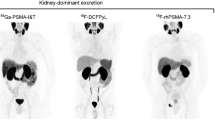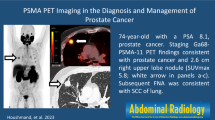Abstract
Purpose
Little is known about the efficacy of prostate-specific membrane antigen (PSMA)–targeted radioligand therapy (RLT) against liver metastases of metastatic castration-resistant prostate cancer (mCRPC). We retrospectively analyzed efficacy-related outcomes of 177Lu-PSMA-617 RLT in this setting and potential predictors of those outcomes.
Methods
Twenty-eight consecutive mCRPC patients with liver metastases given 177Lu-PSMA-617 RLT were analyzed retrospectively. Their planned regimen was 4–6 cycles at 6 ± 2-week intervals; the mean activity/cycle was 6.5 ± 0.5 GBq. Hepatic response was determined by modified positron emission tomography response criteria in solid tumors; association of such response with overall survival (OS) was tested, as were relationships of the selected patient, disease, and treatment characteristics with hepatic progression-free survival (PFShep) and OS. Survival analyses used Kaplan–Meier curves, log-rank test at p < 0.05 significance, and Cox proportional-hazards modeling.
Results
Median (minimum–maximum) follow-up was 37.5 (2.3–50.6) months. In liver metastases, complete or partial response was observed in 6 patients (21%) each, and stable disease in 1 (4%), for hepatic disease control in 46%. Overall, median (95% confidence interval) PFShep was 5.7 (2.2–9.2) months, and OS, 11.7 (3.0–20.4) months. Patients with hepatic disease control did not reach the median OS, while those with hepatic progressive disease had median OS (95% confidence interval) of 6.4 (1.6–11.1) months. In multivariate analysis, hepatic disease control by 177Lu-PSMA-617 RLT was significantly independently associated with OS, as was a prostate-specific antigen decline of ≥ 50% after 2 RLT cycles, and good baseline performance status (Eastern Cooperative Oncology Group 0–1). Hepatic tumor burden (≤ 25% vs. > 25% of liver volume) had no apparent relationship with hepatic tumor response, PFShep, or OS.
Conclusion
177Lu-PSMA-617 RLT frequently controlled liver metastases, resulting in long PFShep and significantly improved OS. Hepatic tumor burden appeared to lack any relationship with treatment efficacy, supporting 177Lu-PSMA-617 RLT of late-stage/end-stage mCRPC with liver metastases.





Similar content being viewed by others
References
Bray F, Ferlay J, Soerjomataram I, Siegel RL, Torre LA, Jemal A. Global cancer statistics 2018: GLOBOCAN estimates of incidence and mortality worldwide for 36 cancers in 185 countries. CA Cancer J Clin. 2018;68:394–424.
Kirby M, Hirst C, Crawford ED. Characterising the castration-resistant prostate cancer population: a systematic review. Int J Clin Pract. 2011;65:1180–92.
Watson PA, Arora VK, Sawyers CL. Emerging mechanisms of resistance to androgen receptor inhibitors in prostate cancer. Nat Rev Cancer. 2015;15:701–11.
Fizazi K, Higano CS, Nelson JB, Gleave M, Miller K, Morris T, et al. Phase III, randomized, placebo-controlled study of docetaxel in combination with zibotentan in patients with metastatic castration-resistant prostate cancer. J Clin Oncol. 2013;31:1740–7.
Halabi S, Lin C-Y, Kelly WK, Fizazi KS, Moul JW, Kaplan EB, et al. Updated prognostic model for predicting overall survival in first-line chemotherapy for patients with metastatic castration-resistant prostate cancer. J Clin Oncol Off J Am Soc Clin Oncol. 2014;32:671–7.
Alumkal JJ, Chowdhury S, Loriot Y, Sternberg CN, de Bono JS, Tombal B, et al. Effect of visceral disease site on outcomes in patients with metastatic castration-resistant prostate cancer treated with enzalutamide in the PREVAIL Trial. Clin Genitourin Cancer. 2017;15:610–617.e3.
Pond GR, Sonpavde G, de Wit R, Eisenberger MA, Tannock IF, Armstrong AJ. The prognostic importance of metastatic site in men with metastatic castration-resistant prostate cancer. Eur Urol. 2014;65:3–6.
Loriot Y, Fizazi K, de Bono JS, Forer D, Hirmand M, Scher HI. Enzalutamide in castration-resistant prostate cancer patients with visceral disease in the liver and/or lung: outcomes from the randomized controlled phase 3 AFFIRM trial: enzalutamide and visceral mets in AFFIRM. Cancer. 2017;123:253–62.
Hofman MS, Violet J, Hicks RJ, Ferdinandus J, Thang SP, Akhurst T, et al. [177Lu]-PSMA-617 radionuclide treatment in patients with metastatic castration-resistant prostate cancer (LuPSMA trial): a single-centre, single-arm, phase 2 study. Lancet Oncol. 2018;19:825–33.
Rahbar K, Ahmadzadehfar H, Kratochwil C, Haberkorn U, Schäfers M, Essler M, et al. German multicenter study investigating 177 Lu-PSMA-617 radioligand therapy in advanced prostate cancer patients. J Nucl Med. 2017;58:85–90.
Kratochwil C, Giesel FL, Stefanova M, Beneova M, Bronzel M, Afshar-Oromieh A, et al. PSMA-targeted radionuclide therapy of metastatic castration-resistant prostate cancer with 177Lu-labeled PSMA-617. J Nucl Med. 2016;57:1170–6.
Bräuer A, Grubert LS, Roll W, Schrader AJ, Schäfers M, Bögemann M, et al. 177Lu-PSMA-617 radioligand therapy and outcome in patients with metastasized castration-resistant prostate cancer. Eur J Nucl Med Mol Imaging. 2017;44:1663–70.
Wahl RL, Jacene H, Kasamon Y, Lodge MA. From RECIST to PERCIST: evolving considerations for PET response criteria in solid tumors. J Nucl Med. 2009;50:122S–50S.
Khreish F, Ebert N, Ries M, Maus S, Rosar F, Bohnenberger H, et al. 225Ac-PSMA-617/177Lu-PSMA-617 tandem therapy of metastatic castration-resistant prostate cancer: pilot experience. Eur J Nucl Med Mol Imaging. 2020;47:721–8.
Ezziddin S, Khalaf F, Vanezi M, Haslerud T, Mayer K, Al Zreiqat A, et al. Outcome of peptide receptor radionuclide therapy with 177Lu-octreotate in advanced grade 1/2 pancreatic neuroendocrine tumours. Eur J Nucl Med Mol Imaging. 2014;41:925–33.
Gaertner FC, Halabi K, Ahmadzadehfar H, Kürpig S, Eppard E, Kotsikopoulos C, et al. Uptake of PSMA-ligands in normal tissues is dependent on tumor load in patients with prostate cancer. Oncotarget. 2017;8:55094–103.
Scher HI, Morris MJ, Stadler WM, Higano C, Basch E, Fizazi K, et al. Trial design and objectives for castration-resistant prostate cancer: updated recommendations from the prostate cancer clinical trials working group 3. J Clin Oncol Off J Am Soc Clin Oncol. 2016;34:1402–18.
Ahmadzadehfar H, Schlolaut S, Fimmers R, Yordanova A, Hirzebruch S, Schlenkhoff C, et al. Predictors of overall survival in metastatic castration-resistant prostate cancer patients receiving [177Lu]Lu-PSMA-617 radioligand therapy. Oncotarget. 2017;8:103108–16.
Goodman OB, Flaig TW, Molina A, Mulders PFA, Fizazi K, Suttmann H, et al. Exploratory analysis of the visceral disease subgroup in a phase III study of abiraterone acetate in metastatic castration-resistant prostate cancer. Prostate Cancer Prostatic Dis. 2014;17:34–9.
Kim YJ, Kim Y-I. Therapeutic Responses and Survival Effects of 177Lu-PSMA-617 Radioligand Therapy in Metastatic Castrate-Resistant Prostate Cancer: A Meta-analysis. Clin Nucl Med. 2018;43:728–34.
Chi KN, Kheoh T, Ryan CJ, Molina A, Bellmunt J, Vogelzang NJ, et al. A prognostic index model for predicting overall survival in patients with metastatic castration-resistant prostate cancer treated with abiraterone acetate after docetaxel. Ann Oncol. 2016;27:454–60.
Boegemann M, Schlack K, Früchtenicht L, Steinestel J, Schrader AJ, Wennmann Y, et al. A prognostic score for overall survival in patients treated with abiraterone in the pre- and post-chemotherapy setting. Oncotarget. 2019;10:5082–91.
Anampa-Guzman AC, Sulca-Huamani O, Perez-Mendez R, Mendoza-Soto G, Contreras Chavez P, Aliaga R. Prognostic factors for overall survival in patients with metastatic castration-resistant prostate cancer: secondary analysis. J Clin Oncol. 2017;35:e597.
Kwekkeboom DJ, de Herder WW, Kam BL, van Eijck CH, van Essen M, Kooij PP, et al. Treatment with the radiolabeled somatostatin analog [ 177 Lu-DOTA 0 ,Tyr 3 ]octreotate: toxicity, efficacy, and survival. J Clin Oncol. 2008;26:2124–30.
Ferdinandus J, Eppard E, Gaertner FC, Kürpig S, Fimmers R, Yordanova A, et al. Predictors of response to radioligand therapy of metastatic castrate-resistant prostate cancer with 177 Lu-PSMA-617. J Nucl Med. 2017;58:312–9.
Violet J, Jackson P, Ferdinandus J, Sandhu S, Akhurst T, Iravani A, et al. Dosimetry of 177 Lu-PSMA-617 in metastatic castration-resistant prostate cancer: correlations between pretherapeutic imaging and whole-body tumor dosimetry with treatment outcomes. J Nucl Med. 2019;60:517–23.
Grubmüller B, Senn D, Kramer G, Baltzer P, D’Andrea D, Grubmüller KH, et al. Response assessment using 68Ga-PSMA ligand PET in patients undergoing 177Lu-PSMA radioligand therapy for metastatic castration-resistant prostate cancer. Eur J Nucl Med Mol Imaging. 2019;46:1063–72.
Heinzel A, Boghos D, Mottaghy FM, Gaertner F, Essler M, von Mallek D, et al. 68Ga-PSMA PET/CT for monitoring response to 177Lu-PSMA-617 radioligand therapy in patients with metastatic castration-resistant prostate cancer. Eur J Nucl Med Mol Imaging. 2019;46:1054–62.
Acknowledgments
Robert J. Marlowe, Spencer-Fontayne Corporation, Jersey City, NJ, USA, edited this manuscript.
Author information
Authors and Affiliations
Corresponding author
Ethics declarations
Conflict of interest
The authors declare that they have no conflict of interest.
Ethical approval
All procedures performed in the patients described herein were in accordance with the ethical standards of the Institutional and/or National Research Ethics Committees and with the 1964 Helsinki Declaration and its later amendments, or with comparable ethical standards. This report does not include any animal studies.
Informed consent
Written informed consent for 177Lu-PSMA-617 RLT and the use of their de-identified data in scientific analyses and reports were obtained from all study participants.
Additional information
Publisher’s note
Springer Nature remains neutral with regard to jurisdictional claims in published maps and institutional affiliations.
This article is part of the Topical Collection on Theragnostic.
Rights and permissions
About this article
Cite this article
Khreish, F., Kochems, N., Rosar, F. et al. Response and outcome of liver metastases in patients with metastatic castration-resistant prostate cancer (mCRPC) undergoing 177Lu-PSMA-617 radioligand therapy. Eur J Nucl Med Mol Imaging 48, 103–112 (2021). https://doi.org/10.1007/s00259-020-04828-5
Received:
Accepted:
Published:
Issue Date:
DOI: https://doi.org/10.1007/s00259-020-04828-5




